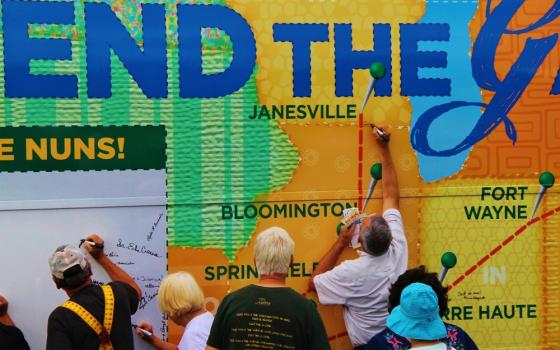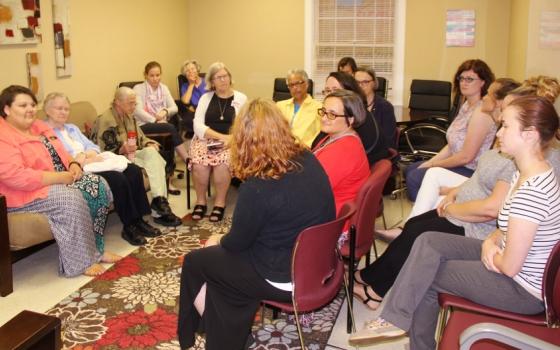Global Sisters Report brings you special coverage during NETWORK's 2016 Nuns on the Bus tour, which started July 11 in Wisconsin, runs through the Republican National Convention in Cleveland, Ohio, and concludes July 29 at the Democratic National Convention in Philadelphia. See more photos day by day, News from the Road blogs and videos from NETWORK Lobby, the sponsor of Nuns on the Bus.
The opportunity to be a Nun on the Bus is a multi-dimensional blessing. We are privileged to hear stories of pain and promise, challenge and opportunity, impasse and creative responses to systemic injustice.
Social Service Sr. Simone Campbell keeps reminding us that, in effect, we are missionaries. We are on a mission to mend the gaps. To the observer the public advocacy side of being a nun on the bus is perhaps more apparent, but there is a profound pastoral side to our mission as well. We are listening to how the gaps are impacting folks across this country in real and immediate ways. We are also witnesses to the resilient efforts of communities to reweave the fabric of our society.
Community is key. The nine of us boarded the bus in Madison as relative strangers to one another. Most of us, in fact, had never even met before. Now that we have arrived in our fourth state and seventh city, it is hard to believe that I have not always known these sisters of mine. We certainly belong to and love our respective religious communities. We know that our sisters are praying for and supporting us across the miles. But we are also now members of another community — we are, now and forever more, Nuns on the Bus.
Prayer has been key to crafting this sense of community among us so quickly. Most days, before we board the bus in the morning, we find a quiet spot for community prayer in the motherhouse where we have found gracious hospitality the night before. Other days we pray together on the bus at the beginning of our morning journey. Whatever the location, contemplation and sharing of the heart brings us together and focuses us on our mission.
Tears have also brought us together as we have met ordinary folks who are struggling to meet basic needs and provide for their families. I will never forget Julie, who teared up as she shared her sadness at not being able to provide safe affordable housing for her three children because she could not find a job in her area that provided a living wage. Or Anne, who, because she lives in a state that has not expanded Medicaid benefits, almost died when she was taken to an emergency room for care that had reached a crisis level because she did not have health insurance and thus could not afford regular checkups. It is difficult, if not impossible, to avoid having your heart broken open, again and again, by such stories. Tears are a healing and human response to this sacred sharing.
In our mission to reweave the fabric of society, we are weaving together the threads of our individual stories and experiences with those we meet along the way. It is no coincidence that the graphic on the side of our bus resembles the squares of a quilt. Each state of our union is part of a whole and we have heard certain patterns emerging across our trip. During our caucus events and site visits, we have heard how problems like the lack of affordable mental health care, stable funding for K-12 and higher education, inadequate public transportation systems, and the prevalence of only low-wage employment for job seekers are tearing at the fabric of our society. While there are some variations in the ways these gaps color the lives of the communities we have visited, the overwhelming pattern that is emerging is one of widening gaps caused by policies that do not promote or serve the common good.
At our caucus event in Terre Haute, Sister Simone told the crowd: "I believe that in the 21st century it is necessary for us to work in community to make change."
In St. Louis, we spent a few hours with one community of women working on the multi-dimensional problems facing their community. Voice of Women is a community development organization that unites women to address issues affecting their neighborhood, such as gentrification, lack of access to banking and affordable lending, and food insecurity. Their micro-lending and savings programs provide the economic engine that helps community members thrive. The community garden provides healthy vegetables and brings folks together to tend the garden and relationships. During our tour of the neighborhood, I met a woman around my age who was raising her children in the same house in the neighborhood where her grandmother had raised her family. She was committed to the future of her community and wanted to make sure that her 8-year-old daughter would have the same opportunity to stay connected to this resilient community, even as it changes and becomes more racially and economically diverse.
We are about half way through this leg of the trip. The community we are crafting informs our advocacy and gives us food for the journey. I cannot help but think of the words of the prophet Isaiah:
On this mountain (or on this Nuns on the Bus trip),
God will prepare a feast of rich food for all peoples,
a banquet of aged wine — the best of meats and the finest of wines.
On this mountain God will destroy
the shroud that enfolds all peoples,
the sheet that covers all nations;
God will swallow up death for ever.
Our God will wipe away the tears
from all faces.
As we get closer to Cleveland and the Republican National Convention, there will no doubt be more tears and more stories. Yet another blessing of being a nun on the bus is the chance to carry these sacred stories in my heart and share them in order to inform new policies crafted to mend the gaps.
[Susan Rose Francois is a member of the Congregation Leadership Team for the Sisters of St. Joseph of Peace. She is a regular contributor to GSR's Horizons column and was a Bernardin scholar at Catholic Theological Union and has ministered as a justice educator and advocate. Read more of her work on her blog, At the Corner of Susan and St. Joseph.]


